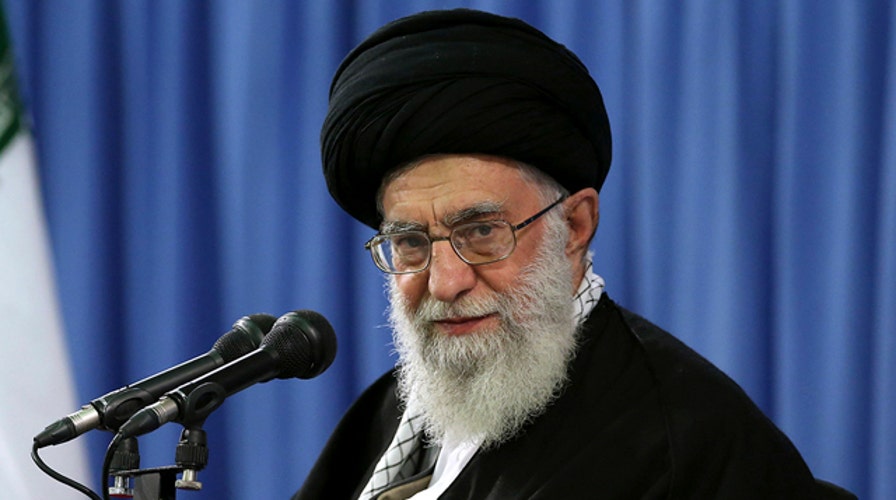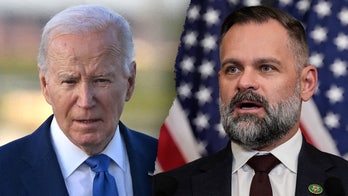Iran's top leader stops short of endorsing nuclear deal
Ayatollah Khamenei insists final agreement must include immediate removal of sanctions and no 'special monitoring' of Iran's nuclear program
Fiery criticism from Iran's Supreme Leader, coupled with steep demands from the upper echelon of the regime, are throwing the nuclear "deal" reached last week into doubt -- with Iran and the U.S. each claiming the agreement said different things, and neither side backing down.
Supreme Leader Ayatollah Ali Khamenei, who has final say on all state matters, tore into the U.S. in remarks published on his official website and on his Twitter account.
Khamenei made clear he was neither endorsing nor rejecting the framework deal announced last week. But he challenged the way the U.S. was describing it -- specifically, a fact sheet put out by the White House saying sanctions would be removed only after inspectors verify Iran's compliance.
The Ayatollah, in one tweet, claimed the fact sheet was "contrary to what was agreed."
In another, he said: "I trust our negotiators, but I'm really worried as the other side is into lying & breaching promises; an example was White House fact sheet."
Ever since the preliminary deal was unveiled, Iranian officials have claimed -- in their own remarks and fact sheets -- that the agreement allows for sanctions to be lifted immediately once a final deal is reached.
On Thursday, both the Ayatollah and Iranian President Hassan Rouhani again insisted that all sanctions be removed as soon as a deal is reached, or implemented.
"We will not sign any agreement, unless all economic sanctions are totally lifted on the first day of the implementation of the deal," Rouhani said during a ceremony marking Iran's nuclear technology day, which celebrates the country's nuclear achievements.
But the U.S. was not backing down.
State Department spokesman Jeff Rathke said Thursday that the White House fact sheet -- which claimed sanctions relief was conditional -- was accurate.
"Sanctions will be suspended in a phased manner upon verification that Iran has met specific commitments," he said. "Those are among the agreed-upon parameters."
He could not say whether it's possible that Iran could actually meet those commitments on day one of any deal, but stressed that sanctions relief "will only begin" when the country takes "major nuclear steps" and increases its so-called "breakout time" -- the time it would take to get enough fissile material for a weapon -- to at least one year.
At the same time, Rathke said, "we're not negotiating in public." He acknowledged all sides have a "very tough series of negotiations" ahead. He also could not say if a final deal would include a signed document.
The U.S., Iran and five other world powers merely announced a framework last week and are trying to reach a final deal by a June 30 deadline.
In that time, both U.S. and Iran officials are trying to sell the framework to their own people.
As part of that, it had been expected that Iran's leaders would position the agreement as a win for their country. Indeed, the remarks Thursday surely are part of that posturing.
But the split over the pace and nature of sanctions relief cuts to a fundamental issue, and several influential U.S. lawmakers have pointed to that split in questioning what was actually agreed to last week.
"As each new day reveals a new disagreement, it's increasingly clear that Iran, in fact, failed to reach agreement with the United States and its partners on a political framework that addresses all parameters of a comprehensive agreement. At best, Iran agreed to disagree with the United States on key nuclear weapons-related issues and to continue talks," Sen. Mark Kirk, R-Ill., said in a statement on Thursday.
When Congress returns from a break next week, Republican senators -- with some Democratic support -- are planning to push a bill that would demand Congress have a say in any nuclear deal, a bill President Obama opposes.
The sanctions in question have had a crippling effect on Iran's economy. Since 2012, the sanctions have reduced Iranian exports of oil by nearly 1.5 million barrels per day -- around 60 percent of its production -- to around 1 million barrels per day, Reuters reports.
Obama on Thursday -- speaking in Jamaica, where he visited in advance of a summit in Panama -- continued to defend the deal framework.
"But as I've said from the start, this is not done until it's done," Obama said. He said the next few months will be "critical."
A senior Israeli defense official repeated his nation's fears Thursday that Iran could still obtain a nuclear weapon if sanctions were lifted immediately, and would have additional funds to arm regional groups.
"The moment the sanctions are removed, tens of billions [of dollars] will flow to their coffers," Amos Gilad said in a radio interview following Rouhani's speech, according to Reuters. "They will get rich. They will have the power to support the entire network of missiles and rockets."
Iran's top leader also cautioned that the six world powers -- five permanent U.N. Security Council members and Germany -- are "not to be trusted" and may try "to limit Iran" in further talks.
A lot remains to be done until the deal is finalized, Khamenei said, adding it may take more than three months.
The Associated Press contributed to this report.





